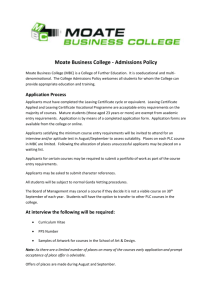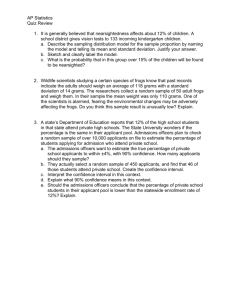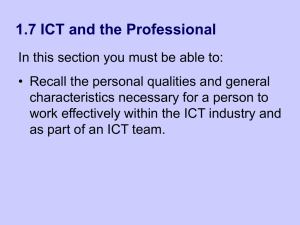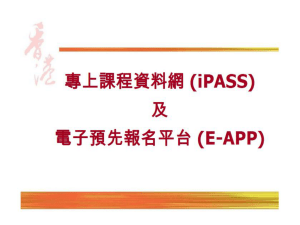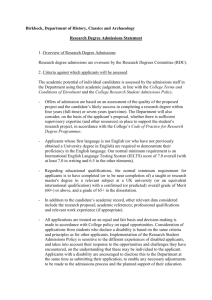Admissions Procedure ConsSci 2015
advertisement
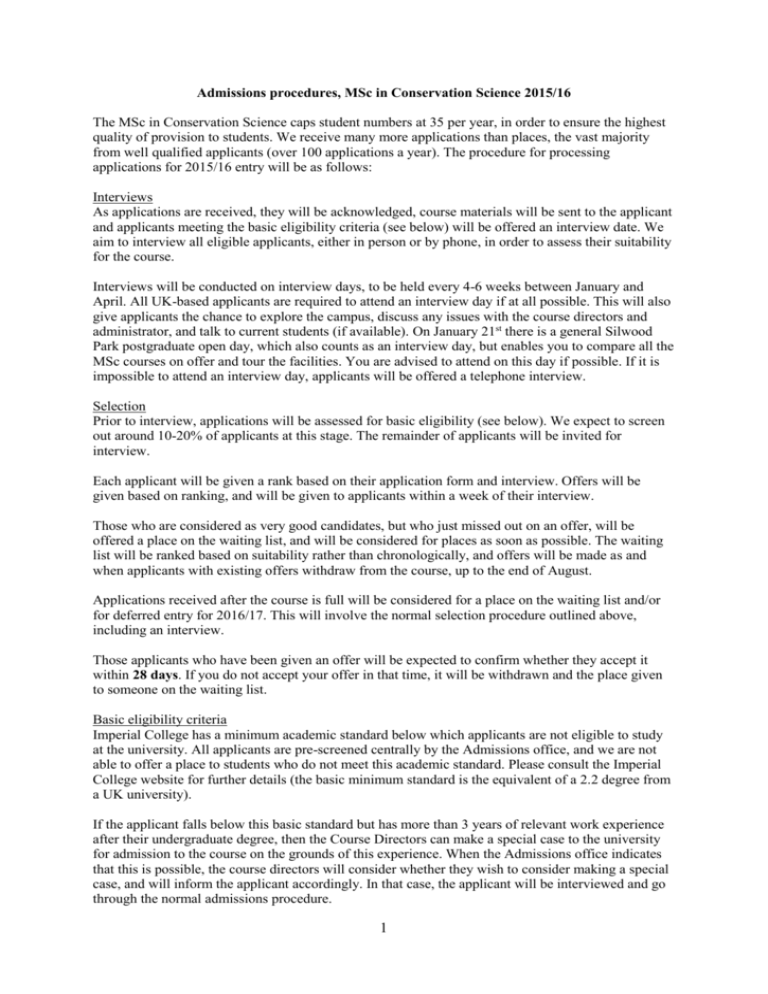
Admissions procedures, MSc in Conservation Science 2015/16 The MSc in Conservation Science caps student numbers at 35 per year, in order to ensure the highest quality of provision to students. We receive many more applications than places, the vast majority from well qualified applicants (over 100 applications a year). The procedure for processing applications for 2015/16 entry will be as follows: Interviews As applications are received, they will be acknowledged, course materials will be sent to the applicant and applicants meeting the basic eligibility criteria (see below) will be offered an interview date. We aim to interview all eligible applicants, either in person or by phone, in order to assess their suitability for the course. Interviews will be conducted on interview days, to be held every 4-6 weeks between January and April. All UK-based applicants are required to attend an interview day if at all possible. This will also give applicants the chance to explore the campus, discuss any issues with the course directors and administrator, and talk to current students (if available). On January 21st there is a general Silwood Park postgraduate open day, which also counts as an interview day, but enables you to compare all the MSc courses on offer and tour the facilities. You are advised to attend on this day if possible. If it is impossible to attend an interview day, applicants will be offered a telephone interview. Selection Prior to interview, applications will be assessed for basic eligibility (see below). We expect to screen out around 10-20% of applicants at this stage. The remainder of applicants will be invited for interview. Each applicant will be given a rank based on their application form and interview. Offers will be given based on ranking, and will be given to applicants within a week of their interview. Those who are considered as very good candidates, but who just missed out on an offer, will be offered a place on the waiting list, and will be considered for places as soon as possible. The waiting list will be ranked based on suitability rather than chronologically, and offers will be made as and when applicants with existing offers withdraw from the course, up to the end of August. Applications received after the course is full will be considered for a place on the waiting list and/or for deferred entry for 2016/17. This will involve the normal selection procedure outlined above, including an interview. Those applicants who have been given an offer will be expected to confirm whether they accept it within 28 days. If you do not accept your offer in that time, it will be withdrawn and the place given to someone on the waiting list. Basic eligibility criteria Imperial College has a minimum academic standard below which applicants are not eligible to study at the university. All applicants are pre-screened centrally by the Admissions office, and we are not able to offer a place to students who do not meet this academic standard. Please consult the Imperial College website for further details (the basic minimum standard is the equivalent of a 2.2 degree from a UK university). If the applicant falls below this basic standard but has more than 3 years of relevant work experience after their undergraduate degree, then the Course Directors can make a special case to the university for admission to the course on the grounds of this experience. When the Admissions office indicates that this is possible, the course directors will consider whether they wish to consider making a special case, and will inform the applicant accordingly. In that case, the applicant will be interviewed and go through the normal admissions procedure. 1 Eligibility criteria specific to the MSc in Conservation Science The Course Directors are looking for people who have the potential and the drive to make a major positive contribution to the field of international conservation. This potential can be demonstrated in a number of ways: Academic attainment. If an applicant has a First Class degree they are a strong candidate for admission. We expect most applicants to have at least a 2.1. Each year we also admit several students with 2.2 degrees, on the basis of their exceptional potential, experience and commitment to conservation. These students often go on to excel throughout the course. A passion for conservation. We assess this from your statement and at interview; it will be demonstrated by your interest in and understanding of the issues, and demonstrable dedication to building a career in conservation. Ability both to benefit from and contribute to the course. The course has a unique structure and teaching style which suits some people more than others. It is a closely knit and interactive group. We assess your ability to thrive in this environment, to work positively with other course members, to make full use of the opportunities that the course provides as a springboard for your career, and to be an ambassador for the course in your future career. Conservation experience. The majority of our applicants have at least 12 months of experience in conservation work, either in the UK or overseas. The nature of the work (desk, field etc) is not as important as the insights that the applicant has gained from that work. We very rarely take people directly out of university, even with summer vacation work experience. Instead we suggest that you spend a year or two working in conservation to get a feel for the real-world issues involved; not only will this enable you to gain more from the course, but will enable you to contribute to it as well. OR Experience in a relevant field. Conservation requires a lot of different skills, and work experience in other fields often gives people a unique insight into the issues and approaches to tackling them. Relevant fields might include marketing, project management, IT, human resources, engineering, development, but there are many others. There is no requirement for candidates to have a biological, or even a science background. Some of our most successful students have come from fields such as translation, philosophy, architecture, international relations, engineering, IT. Accepted applicants have no typical profile. A typical rejected candidate will be applying directly from an undergraduate biology degree with little prior experience, and thinking about doing a conservation Masters because that was a course that they enjoyed at university and they are not sure what to do next. This person would be advised to reapply in a few years when they have amassed some real-world experience. If you are in doubt about your eligibility, then do either make an enquiry or apply! 2

